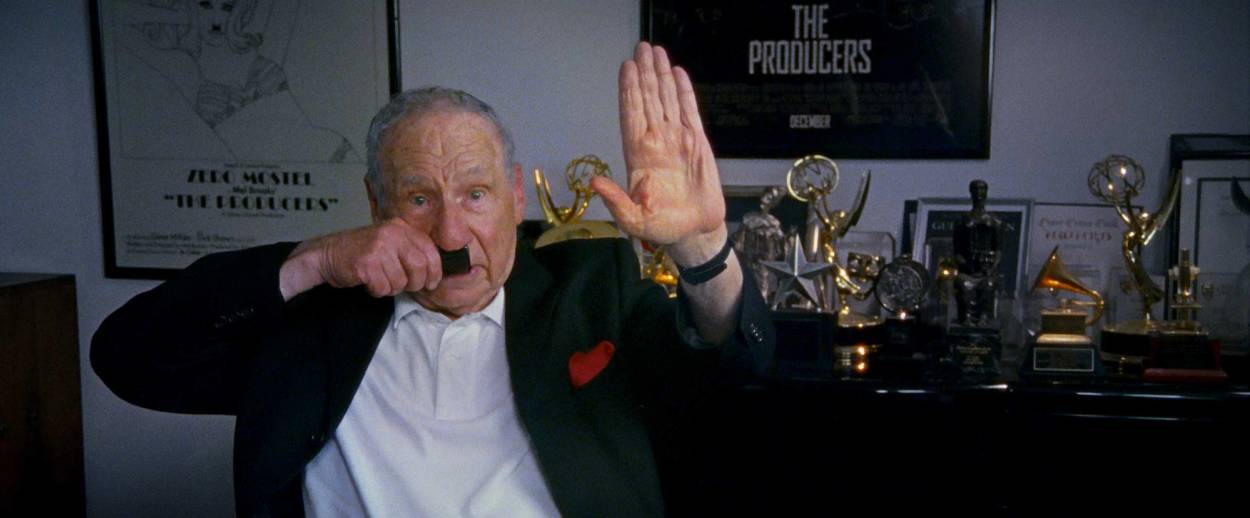Are We Allowed to Joke About the Holocaust?
A new documentary looks at ‘the ultimate taboo’




Can we laugh at genocide? The Last Laugh, a film by Ferne Pearlstein, attempts to answer the question through interviews with Holocaust survivors, with authors Etgar Keret and Shalom Auslander, and with a passel of comedians including Mel Brooks, Carl Reiner, Sarah Silverman, Gilbert Gottfried, Susie Essman, Harry Shearer, and Judy Gold.
The best thing about the movie, which opens in New York City on Friday and in Los Angeles on March 17, is that it doesn’t answer the question. There’s no voice-over, no narrator telling us what to think. The film merely presents a variety of points of view—accompanied by clips from The Producers, The Great Dictator, South Park, and Curb Your Enthusiasm, from a children’s production of Brundibar and an adult cabaret performance in Theresienstadt, from snippets of Chris Rock and Borat and Louis C.K. performances. It’s up to the viewer to decide what to think, not only about whether the Holocaust is suitable fodder for humor but also about whether any tragedy—rape, racism, child molestation—can be turned into a joke … and if so, how. (In other words, one should see this movie only with smart friends, and then one must go out to eat and argue. It’s the way of our people.)
The film opens with a quote from Heinrich Mann: “Whoever has cried enough, laughs.” But this, too, raises questions! Is it ever possible to cry enough about the Holocaust? And does laughing inherently mean you’re finished crying? There’s no time to ponder, though, because we’re immediately launched into a rapid montage of interview fragments and Busby Berkeley-esque Nazi numbers (ooh, it’s the overhead shot of the rotating human swastika from The Producers!).
Only three jokes in the movie made me laugh out loud. One comes early on, told in tag-team format by Rob Reiner and Gilbert Gottfried—the former seated comfortably in an empty theater, the latter in a diner. You’ve probably heard it: Two Jews are sent to assassinate Hitler. They stake out his home, but an hour after he’s supposed to be there, he hasn’t shown up. Two hours later, still no sign of Hitler. One Jew turns to the other and says, “Gee, I hope nothing happened to him!”

The second joke is from Sarah Silverman in a 2005 stand-up clip. She observes that she always knows when Hitler’s birthday is, because on Entertainment Tonight, right before they cut to commercial, they say, “This person is responsible for the deaths of 6 million Jews! Is it a) Ted Danson? b) Patrick Duffy…?”
The third joke is Mel Brooks pretending to be Hitler yelling at Eva Braun for killing a bug. She says to him in protest, “It’s just a bug!” Hitler sputters, “It’s just a bug? It’s just a bug?? Ask the bug’s family! What’s the matter with you!”
Of course, we all know that the quickest way to make a joke unfunny is to analyze why it’s funny. (Well, in truth, the quickest way to make a joke unfunny is to have it be told by Jeff Dunham.) But one reason these jokes work is that they don’t laugh at Jews as victims. The first joke is for the in-group, the Jews—it’s funny because Gottfried’s delivery sounds like all our bubbes and zaydes. And it’s funny because of the ironic juxtaposition of worrying about something happening to Hitler since it will deprive you of the joy of killing him. Silverman’s joke is funny because it’s not a joke about the Holocaust; it’s a joke about the tone-deafness of the media, which uses Hitler as quiz-centric entertainment alongside a minor actor who starred in The Man From Atlantis. And again, the humor’s in her delivery, a mimicry of the smarmy white-man interstitial voice-over announcer. And the Mel Brooks joke is funny because Hitler’s the butt of it: How can Hitler get so worked up about his girlfriend squashing an insect but not about his own murder of millions of humans? And again, the delivery sells it: Brooks’ familiar Germanic accent and the way he conveys Hitler’s stammering, impotent outrage.
The first joke mocks Jewish foibles from an insider’s perspective. The second mocks the trivializing of the Holocaust. The third mocks Hitler. None of them diminish the horror of the Holocaust itself.
Elsewhere in the movie, Etgar Keret points out that humor is a form of protest and a weapon for the weak. Jewish humor through the years has often relied on the premise of the little guy standing up to unjust authority. (“Why the chimney sweeps?” “Why the Jews?”) Jokes about Nazis and about the czar are an attempt to diminish their power. Making fun of the powerless isn’t funny. Gottfried, who turns out to be the movie’s MVP commentator (who knew?) expresses it succinctly: Nazi jokes are OK; Holocaust jokes aren’t.
This squares with recent conversations in the comedy world about what kinds of rape jokes—if any—work. Rape jokes that hit the mark are rape jokes about our culture—which devalues women’s voices and sexual agency and experiences—and about dudely cluelessness and entitlement. (Think about Amy Schumer’s Friday Night Lights parody in which the football players simply cannot comprehend their coach’s rule that they not rape anyone: “Can we rape at away games?” “What if it’s Halloween and she’s dressed as a sexy cat?” Or Louis C.K.’s seemingly throwaway line, “I’m not condoning rape, obviously—you should never rape anyone. Unless you have a reason, like if you want to fuck somebody and they won’t let you.” As Lindy West points out, only a psychopath would think such a thing, so the joke itself is telling the listener not to sympathize with the kind of person who’d tell it. It’s sophisticated, smart humor—shocking, yes, but its sympathies are with the victim and not the perpetrator.) So it is with Holocaust jokes.
The movie does present a lot of jokes that I, personally, don’t find funny. Mel Brooks doing Hitler speaking Germanic gibberish? Too schtick-y. Hogan’s Heroes? Dated, laugh-track-y, too broad. Lenny Bruce’s arrest-worthy material? Nope. The humor is based solely in him saying taboo words and racial slurs. Shock value alone isn’t amusing to me.
But I loved the moments in the film that clearly show that reasonable people can differ. There’s a montage of comics talking about how horrid they find the Oscar-winning Life Is Beautiful. “The worst movie ever made!” David Cross exclaims. “It puts the HA in Holocaust!” Gottfried says. Someone else notes that it’s a concentration-camp movie that’s never honest about what happened in the concentration camps! But the director quickly cuts to Abe Foxman of the ADL, making a reverent face and whispering, “Brilliant!” To Foxman, the movie is about a father protecting a child, and about humor as a survival tool. Foxman is the child of survivors—so do we have any right to question what he finds funny?
Foxman is horrified by a scene in Curb Your Enthusiasm in which Larry David learns that there’s going to be a survivor at a dinner party he’s invited to, so he also brings a survivor: Colby Donaldson, the first runner-up on the TV show Survivor in 2000. I loved it. For me, the humor is in David’s cluelessness about what the word “survivor” means, and in the muscular young Donaldson’s arrogance as he loftily informs an elderly Jew that being on a reality show in the Australian Outback was much more difficult than being in a concentration camp because “we had no snacks!” It’s a parody of entitled solipsism. Foxman is also dismayed by Sacha Baron Cohen singing Borat’s anthem “Throw the Jew Down the Well” to a roomful of bigoted American Southerners. Foxman notes that they’re not laughing at Borat; they’re yee-haw-ing along merrily with his anti-Semitic song. Which is true. But one might point out that the audience in that Southern bar isn’t really who Baron-Cohen is addressing; he wants a mass-media viewer to see the scene and be appalled. Then again, one can ask whether he’s entrapped the bar-goers and whether “coastal elites” mocking those bigoted idiots is at all productive. It’s complicated. Which, again, makes it interesting.
The most compelling character in the movie is Renee Firestone, an Auschwitz survivor and former fashion designer, now in her 90s, who still works as an educator for the Museum of Tolerance. Firestone giggles throughout the movie. She has twinkling blue eyes surrounded by smile lines, and the kind of charisma that makes you pay attention. She’s the embodiment of one of Carl Reiner’s observations: “People are consistent. If you were funny before, you’ll be funny during and you’ll be funny after.” Firestone’s long nails are hand-painted with bright blue and white flowers. In one scene, she attends a survivors’ convention in Las Vegas and rides in a gondola through a fake river in the Venetian Hotel with another Auschwitz survivor, having a grand old time as the gondolier bellows the song “Volare.” The juxtapositions are hilarious. But the other survivor is stone-faced. She tells Firestone, “I remember so many youngsters who perished and will never see this place.” Firestone protests, “But you survived!” The other survivor replies, “The children screaming … it’s like a shadow.” Firestone fires back: “You cannot live in the shadows! I speak about the Holocaust all the time, but I enjoy life! That’s my revenge!”
That said, when her daughter Klara (named after Firestone’s beloved sister, who died in the Holocaust) shows her clips of various comedy bits about Nazis, Renee finds almost none of them funny. This is her prerogative. And when she fails to be amused by a comic at a roast for David Hasselhoff telling the actor/singer, “If they’d played your music in Auschwitz, the Jews would have sprinted for those ovens!” who can blame her? It’s a crappy joke. (Harry Shearer notes that you can tell a crappy joke about your mother-in-law and get a laugh, but your Holocaust joke better be great.)
The film dances around the issue that fury at all Holocaust jokes might be symptomatic of our desire for Jewish victimhood to be special, an inherent part of our identity and no one else’s. Firestone is under no such delusion. “We think the Holocaust was the worst thing ever,” she says. “It lasted 12 years and killed 6 million Jews. But in Rwanda, in four months, 1 million Tutsis were murdered. After the Holocaust we keep saying never again …” and she doesn’t have to finish the sentence. It’s hard to argue with her. It’s easier to get mad at Sarah Silverman for saying in her faux-naïve little-girl voice, “If black people had been in Nazi Germany, the Holocaust wouldn’t have happened.” Pause. “Well, not to the Jews.” Is she wrong? While Foxman bemoans the late Joan Rivers’ (unfunny, admittedly) joke about Heidi Klum, “The last time a German looked this hot, they were pushing Jews into ovens,” Silverman says that even as people fear the Holocaust will be forgotten, “there are genocides all over the world happening! They’re just not happening to Jews. Has it not been forgotten? Might be something to think about when you’re getting mad at Joan Rivers.” Truth.
***
Like this article? Sign up for our Daily Digest to get Tablet Magazine’s new content in your inbox each morning.
Marjorie Ingall is a former columnist for Tablet, the author of Mamaleh Knows Best, and a frequent contributor to the New York Times Book Review.